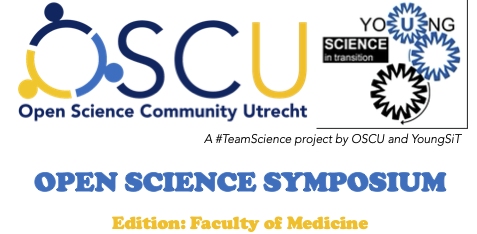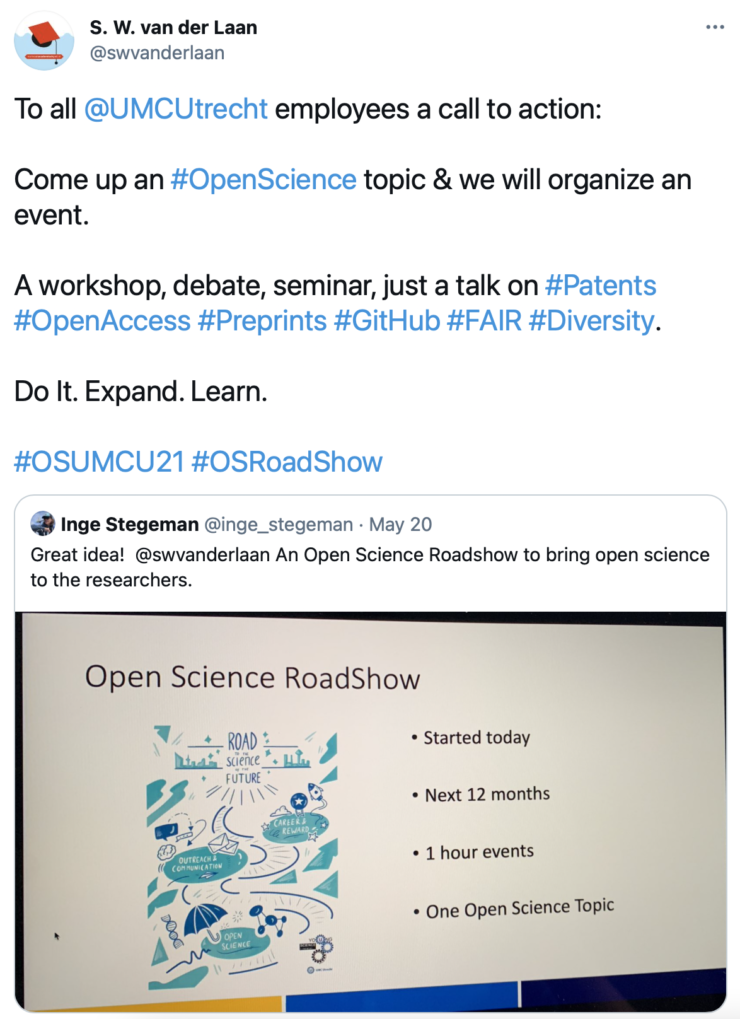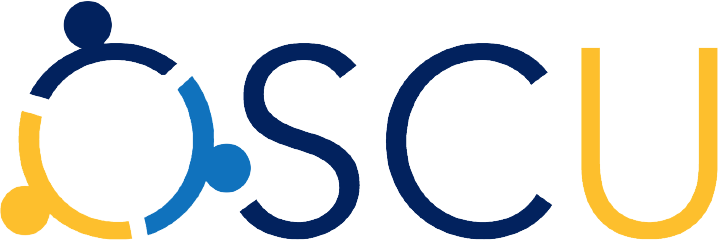News, Blog and Podcast
Open Science Symposium at the Faculty of Medicine: Start of a RoadShow

Open Science is the road to the future. But what is it actually about? Why do policy makers stimulate the transition towards Open Science? What it is in it for me? And… How do I do it? These questions and others were answered at the Open Science Symposium on May 20th at the Faculty of Medicine (that is: the UMCU).
The Symposium was cohosted by Open Science Community Utrecht (OSCU) and Young Science in Transition(YoungSiT), two Utrecht-grown groups pushing for a change. The members of these grassroots initiativesbelieve Science is beautiful, and Science could and should be better; they help shape the Transition we see today in Utrecht.
A diverse range of scientists, staff, and interested parties attended the digital Symposium which was kicked-off by Gerard Pasterkamp, vice-president of the Faculty Open Science Team and yours truly, Sander W. van der Laan, host, Faculty Ambassador of Open Science Community Utrecht. Pasterkamp introduced the Faculty Open Science Team at the UMCU. “Open Science is not something you are executing top-down, it is something that should grow bottom-up”, was pointed out by Pasterkamp and he addressed the possible challenges that scientists face at all stages as funding agencies and society calls for more Open Science. Will you go for the high-impact journal, or the one that is Open Access? Another challenge might be faced when sharing data: how will you handle sharing data in the face of your own ambitions and the potential that others might score with ‘your’ data? Pasterkamp noted that the scientists in the field must do it because otherwise others will.
Open Science is not something you are executing top-down, it is something that should grow bottom-up
Gerard Pasterkamp
Rinze Benedictus, senior strategic staff advisor to the Board of Directors and one of the catalysts behind YoungSiT, gave a bird’s eye view on the many Open Science initiatives at the UMCU. Benedictus pointed out that there is a bigger purpose to Science and there are individual needs and expectations, and one of the issues in Open Science is aligning those two. He also showed the steps that have been taken to develop and change the recognition and rewards in careers at the UMCU for associate professors (qualification portfolio), PhDs (evaluation form) and talent development (career track profiles). Of note is the fact that ±70% of the scientific publications were published open access, and the ‘Taverne’ agreement protects authors from legal issues when openly sharing published work.
The day continued with three interesting short talks and discussions on Open Access & Preprints led by Paulien Wiersma and Bianca Kramer (both UU Library), FAIRifying at the UMCU by Marie-Louise Goudeau(UU Library) and Nico Poppelier (DIT), and The role of the patient by Inge Stegeman (YoungSiT). These interactive sessions gave nice overviews of the tools that we can use to publish for free in Open Access journals, FAIRifying data through DataverseNL, and how to actively involve the public and patients in developing projects.
Openly sharing data might pose issues for individuals and other stakeholders considering valorizing research. Mirko Lukács and Tessa Scharringhausen from the Utrecht Holding, experts in valorization and commercializing scientific output at the Uithof, debated with Benedictus about the pros and cons of intellectual property. One of the take home messages was that the regulations around patents are due for an update, but patents and the principles of Open Science are not mutually exclusive. Open Science is about transparency, meaning open when possible, and closed when necessary.
With 54 attendees the 2.5-hour Symposium was exciting and a success – you can view the presentations and the Symposium in full via this link. As Ambassador to Open Science, I once again take the opportunity to thank the audience for engaging and the speakers for their great talks and contributions.
May 20th was the kick-off for a 12-months Open Science Roadshow at the UMCU. During the next 12-months we will organize events that highlight a specific Open Science principle and its practice at the UMCU. Next on the agenda are the ongoing changes in recognition and rewards at the YoungSiT Symposium Recognition and Rewards: Early Career Academics. Other topics that will be covered are Open Education, how does the application of artificial intelligence relate to Open Science, what should you know when publishing data at the UMCU, and many more.

The Open Science Roadshow will help you get it right, while you have the time. Take a look at the (wo)man in the mirror and make that change.
P.S. As noted on the invite, the 3rd, 8th, 13th, 18th, and 42nd registered attendee will receive an email shortly on how they will obtain a unique signed memento of the Symposium and OSCU.

